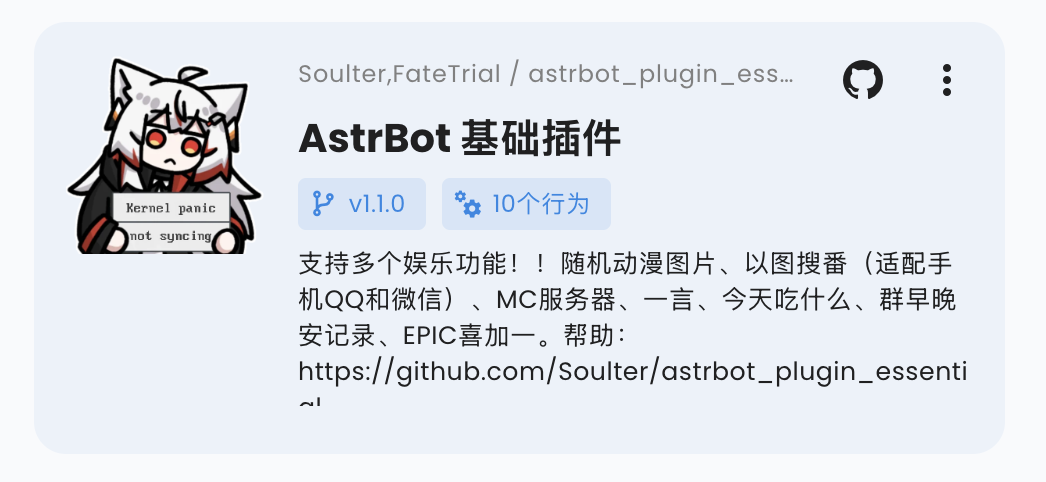AstrBot Plugin Development Guide 🌠
Welcome to the AstrBot Plugin Development Guide! This section will guide you through developing AstrBot plugins. Before we begin, we hope you have the following foundational knowledge:
- Some experience with Python programming.
- Some experience with Git and GitHub.
You're welcome to join our developer-exclusive QQ group: 975206796.
Environment Setup
Obtain the Plugin Template
- Open the AstrBot plugin template: helloworld
- Click
Use this templatein the upper right corner - Then click
Create new repository. - Fill in your plugin name in the
Repository namefield. Plugin naming conventions:- Recommended to start with
astrbot_plugin_; - Must not contain spaces;
- Keep all letters lowercase;
- Keep it concise.
- Recommended to start with
- Click
Create repositoryin the lower right corner.
Clone the Project Locally
Clone both the AstrBot main project and the plugin repository you just created to your local machine.
git clone https://github.com/AstrBotDevs/AstrBot
mkdir -p AstrBot/data/plugins
cd AstrBot/data/plugins
git clone <your-plugin-repository-url>Then, use VSCode to open the AstrBot project. Navigate to the data/plugins/<your-plugin-name> directory.
Update the metadata.yaml file with your plugin's metadata information.
WARNING
Please make sure to modify this file, as AstrBot relies on the metadata.yaml file to recognize plugin metadata.
Set Plugin Logo (Optional)
You can add a logo.png file in the plugin directory as the plugin's logo. Please maintain an aspect ratio of 1:1, with a recommended size of 256x256.

Plugin Display Name (Optional)
You can modify (or add) the display_name field in the metadata.yaml file to serve as the plugin's display name in scenarios like the plugin marketplace, making it easier for users to read.
Debugging Plugins
AstrBot uses a runtime plugin injection mechanism. Therefore, when debugging plugins, you need to start the AstrBot main application.
You can use AstrBot's hot reload feature to streamline the development process.
After modifying the plugin code, you can find your plugin in the AstrBot WebUI's plugin management section, click the ... button in the upper right corner, and select Reload Plugin.
Plugin Dependency Management
Currently, AstrBot manages plugin dependencies using pip's built-in requirements.txt file. If your plugin requires third-party libraries, please be sure to create a requirements.txt file in the plugin directory and list the dependencies used, to prevent Module Not Found errors when users install your plugin.
For the complete format of
requirements.txt, please refer to the pip official documentation.
Development Principles
Thank you for contributing to the AstrBot ecosystem. Please follow these principles when developing plugins, which are also good programming practices:
- Features must be tested.
- Include comprehensive comments.
- Store persistent data in the
datadirectory, not in the plugin's own directory, to prevent data loss when updating/reinstalling the plugin. - Implement robust error handling mechanisms; don't let a single error crash the plugin.
- Before committing, please use the ruff tool to format your code.
- Do not use the
requestslibrary for network requests; use asynchronous network request libraries such asaiohttporhttpx. - If you're extending functionality for an existing plugin, please prioritize submitting a PR to that plugin rather than creating a separate one (unless the original plugin author has stopped maintaining it).
